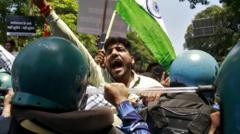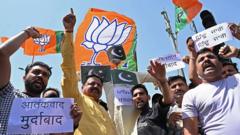In the aftermath of a violent attack in Kashmir that claimed 26 lives, Pakistan's Defense Minister urges for an international inquiry amid rising diplomatic tensions with India.
Kashmir Terror Attack: A Call for International Oversight

Kashmir Terror Attack: A Call for International Oversight
Tensions Escalate Between India and Pakistan Following Deadly Incident
Pakistan's Defense Minister, Khawaja Muhammad Asif, has publicly denied any involvement of his country in the recent terror attack that occurred in the Kashmir region, leading to the deaths of 26 individuals. He has called for an international investigation into the event and stated that Pakistan is open to assisting any inquiry set up by international bodies.
The attack, which happened near Pahalgam—a popular tourist destination in southern Kashmir—has been labeled as one of the most significant terrorist events in the region in recent years. This escalation in violence has put considerable pressure on the already strained relations between India and Pakistan, both of which claim parts of the Kashmir territory.
In response to the attack, India has initiated punitive measures against Pakistan, including the closure of border crossings and the suspension of a vital water-sharing agreement. Indian officials have indicated that at least two Pakistani nationals may be connected to the attack, leading to an intensive inquiry within India.
Minister Asif has argued that India's reaction appears to be politically motivated, asserting that the Indian government is using the attack to justify its actions against Pakistan without conducting a legitimate investigation. He criticized India's decision to suspend the water treaty, suggesting that it is being used as leverage in ongoing tensions.
In efforts to de-escalate the situation, Pakistani officials have sought intervention from the United States, hoping for mediation in the growing dispute. Nonetheless, the narrative from each side remains polarized, contributing to an increasingly complex geopolitical landscape in the region—raising fears over the potential for further conflict.




















